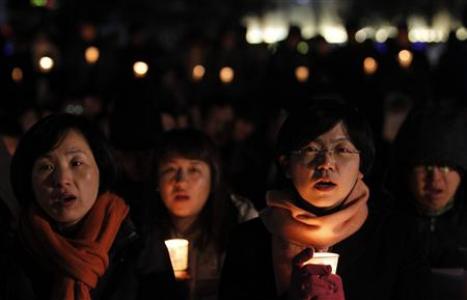Press Release

People sing during a candlelight vigil calling for peace on the Korean peninsular in Seoul November 28, 2010.
South Korean President Lee Myung-bak on Monday labeled North Korea's artillery attack on a southern island a crime against humanity and said Pyongyang will pay the price for any further provocation.
Lee made his first address to the nation since last Tuesday's attack as U.S. as South Korean war ships took part in day two of military maneuvers, prompting concern in regional power China and threats of all-out war from North Korea.
"North Korea will pay the price in the event of further provocations," Lee said. "Attacking civilians militarily is an inhumane crime that is strictly forbidden in a time of war."
The bombardment of the island of Yeonpyeong killed two Marines and two civilians, prompting outrage among South Koreans who say their government has been too weak in its response.
China has proposed emergency talks amid global pressure on Beijing to be more aggressive in helping resolve the standoff between the rival Koreas and try to rein in ally Pyongyang which depends on China for aid.
Washington and Tokyo were non-committal, saying they would consult with Seoul, which was skeptical of the proposal to sit down with North Korea around a table, effectively rewarding it for bad behavior.
The reclusive North was previously offered massive aid in return for disarmament pledges that went unmet.
A senior North Korean official also expressed skepticism about the Chinese call, Japan's Kyodo news agency said. North Korea has yet to issue an official response but the official, speaking on condition of anonymity, said countries "responsible for (the latest standoff)" should first hold talks.
North Korea was typically bellicose in a newspaper commentary on Monday. "The United States is making a mistake if it believes it can surprise anyone or put pressure by bringing in a nuclear-powered aircraft carrier," the Rodong Sinmun newspaper said, quoted by KCNA news agency.
"We don't want war, but we are not afraid of one. If war mongers want to wage provocations against us, we will not hesitate for a moment to strike back and go to the roots of aggression and eliminate the source of war from this land."
The Chinese Foreign Ministry said State Councillor Dai Bingguo, who advises senior leaders on foreign policy, had a phone call with Secretary of State Hillary Clinton late on Sunday.
According to the account on the Foreign Ministry's website (www.mfa.gov.cn), Dai told Clinton: "China feels deeply anxious about developments on the Korean peninsula, and believes it is imperative to strive to ease the current situation. We oppose any actions that could lead to an escalation in tensions.
"At this crucial moment, China and the United States should play a constructive role and strive together to calm the situation and protect the peace and stability of the Korean peninsula."
The United States said six-party talks cannot substitute for action by North Korea to comply with its obligations, referring to disarmament talks which North Korea abandoned two years ago.
The call for the two Koreas, the United States, Japan, and Russia to meet at a forum hosted by China must be reviewed "very cautiously" in view of North Korea's provocations, Seoul said.
A poll requested by the independent East Asia Institute think-tank showed 72 percent of South Koreans surveyed thought the government response to Tuesday's violence was inappropriate and 69 percent supported a "restrained military attack."
That figure was up sharply from less than 30 percent in the previous poll after the sinking of the Cheonan naval vessel in March, also blamed on the North.
Both Beijing and Pyongyang have been pressing regional powers to return to talks in some form or other for the past few months in a move analysts say is aimed at extracting concessions.
China, which agreed with South Korea that the situation was "worrisome," suggested the emergency talks for December. It did not say whether Pyongyang had agreed to join. In the South Korean capital Seoul, dusted in snow, life and business went on as normal despite the raised tensions.
In a sign of the prevailing calm, authorities lifted a ban on South Korean travel to the joint Kaesung industrial complex in North Korea for the day.
Markets mirrored the broader region, as players judged the latest spat as being no worse than previous clashes between the Koreas, who are still technically at war having only signed a truce to stop fighting in the 1950-35 civil war.
"I am worried, but not that worried that I need to stay at home," said Eunhye Kim, an usher showing people from a packed theater. "They don't really want to make war ... there's no gain for either side."
(Additional reporting by Kim Miyoung and Jeremy Laurence in Seoul, Chris Buckley in Beijing and Yoko Kubota in Tokyo; Writing by Nick Macfie; Editing by Sanjeev Miglani)